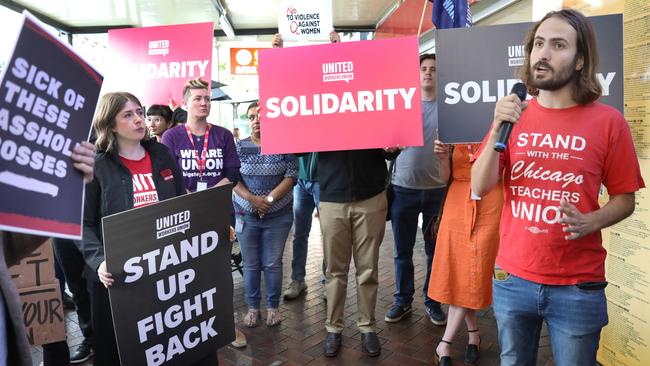Alleged assault on underpaid overseas student at Adelaide bubble tea shop puts spotlight on widespread wage theft across SA
Underpayment of SA workers is rife, a recently published report has found. The issue has been in the spotlight in recent weeks after the alleged assault on an underpaid city worker.
SA News
Don't miss out on the headlines from SA News. Followed categories will be added to My News.
An alleged assault on an underpaid overseas student has further exposed endemic wage theft across the state.
Gouger Street businessman Jason Duan has become the focus of intense scrutiny since an associate allegedly assaulted a young female worker who complained about being paid $10 an hour in his bubble tea shop.
Mr Duan has pubicly defended the payment, saying the 20-year-old was still in training at his Fun Tea outlet, during which she received free food and beverages.
The successful businessman came to South Australia from Beijing in 2009 to study for three years at UniSA, during which he worked part-time at suburban restaurants.
“When I was a young man, I was paid no more than $10 an hour,” he said. “It was usually $8 or $9 an hour.”
According to evidence presented to a parliamentary inquiry, $10 an hour remains the norm for many casual workers within SA’s restaurants.

In a recently published report, a Legislative Council select committee into wage theft revealed underpayment of workers was rife across the state, with an estimated 20 per cent of workers not paid award rates or given full entitlements. The estimated annual cost to SA’s economy was $500m.
Industries where wage theft was prevalent included hospitality, retail, agriculture, horticulture, call centres, hairdressing salons, cleaning, car washing, butchering, the meat industry, fast food, warehousing, labour hire, construction, local government, education and finance.
12 cases of underpaid, exploited workers finalised in SA Employment Tribunal in 2020
Those who were most vulnerable and at risk were migrant workers on temporary visas, young people, women, refugees, overseas students with limited English, labour hire workers, backpackers, digital economy workers, new migrants, casual or seasonal workers and disabled people.
The most common forms of wage theft were not paying award rates, penalties, overtime, superannuation, annual leave, workers’ compensation, redundancies and meal breaks.
Employers also forced workers to be paid in cash, work for free or accept gift vouchers while training, undergo internships and work experience, move into lower paid roles but still perform the same amount of work, “volunteer” to do longer shifts without pay and take unauthorised deductions from workers’ pay packets. There also were employers who under-reported or failed to report income, did not distribute pay slips and kept poor or false records on wages.

The inquiry also found “zombie” enterprise agreements with outdated pay rates still were being used, particularly in the retail industry, while “sham contracting” was rife in the “gig economy”, where companies use digital technology to provide services.
In its interim report, the committee said it had details of “widespread exploitation of workers who had been deprived of wages, superannuation and other entitlements, those who were subject to intimidation, loss of employment and, for some, their visa status, leading to deportation.”
“Despite this information, those representing the commercial sector disputed the very concept that workers were being so misused,” it said. “During the course of the inquiry, however, it came to public notice that multiple large organisations had been significantly underpaying their staff.”
The report said the term “wage theft” had “generated upset from the outset.”
“Some business organisations and peak bodies criticised ‘theft’ as being highly emotive, inaccurate, inappropriate, one with an assumption of injustice that improperly branded employers as criminals when they mistakenly underpaid their employees.
“Some businesses argued that ‘noncompliance’ was more pertinent as instances of underpayment do not generally stem from intent to deprive.”
However, the committee heard evidence of the prevalence of wage theft from exploited workers, trade unions, researchers, community legal services and support centres, multicultural organisations and youth groups. “They provided data, numerous case studies and examples detailing underpayment of wages, unpaid superannuation, allowances, penalties and leave entitlements, along with manipulation of hours, time sheets and contractual arrangements,” said the report.

“In their view, wage theft is virtually the norm, forming the basis of a business model. The common call was for employers engaged in deliberate and systematic wage theft to face criminal penalties.”
Committee chairwoman Labor MLC Irene Pnevmatikos said incidents such as the one that happened at Fun Tea helped expose the extent of wage theft.
“Although the video released last week was horrifying, it is unfortunately not surprising,” she said.
“The committee heard countless stories of underpayments, unpaid entitlements and some cases where workers were not paid at all for their labour.
“This issue is not isolated to one particular workplace or one region, it is widespread and in epidemic proportions.
“It doesn’t matter if you’re a hairdresser, an administrative assistant, a labourer, a retail worker, a farm hand, a carer, a hospitality worker, a tradesperson or an apprentice, no one is immune.’
Ms Pnevmatikos said workers were often silenced against speaking out by
“threatening behaviour from employers, fear of losing hours, their entitlements or losing their jobs entirely”.
“From the growing media attention and community support, more and more workers have had the courage to speak out on the issue,” she said.
“Each time a wage theft story appears in the media, the committee receives an influx of workers who want to tell their story.”
Ms Pnevmatikos said there was “no one fix” for wage theft.
“I believe that we need to improve existing industrial relation legislation that has been eroded by both the state and federal governments as well as to look at new avenues of legislation, such as criminalisation for egregious cases, like the Andrews Government in Victoria,” she said.
“I also believe that action should not be limited to legislation and a multi-faceted approach that includes education schemes for both employees and employers is essential.”
Ms Pnevmatikos said everyone had an obligation to address the issue and be equipped to know their rights and responsibilities.





